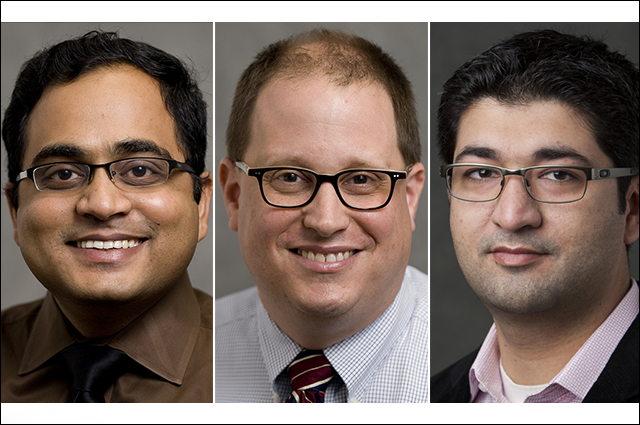Global collaboration

Tufts University engineers are collaborating with United Kingdom experts in engineering, chemistry, and biogeosciences in a new partnership that brings together the National Science Foundation (NSF), the U.S. Department of Agriculture National Institute of Food and Agriculture (USDA NIFA), and three United Kingdom Research and Innovation (UKRI) research councils. Together, the researchers are working to address one of the National Academy of Engineering’s 14 Grand Challenges for Engineering in the 21st Century: managing the nitrogen cycle.
The nitrogen cycle has a central role in the production of food. Nitrogen is needed by all living things, and while it’s plentiful in our air, that nitrogen cannot immediately be used by living organisms. In a process called fixation, microbes found in soil and the roots of some plants use enzymes to convert nitrogen in the air into organic nitrogen, which can be used by plants as nutrients.
Professor Sameer Sonkusale, Professor and Chair Eric Miller, and Associate Professor Usman Khan, all of the Tufts Department of Electrical and Computer Engineering, are partnering with colleagues at Keele University and the University of Birmingham in the U.K. Together, the researchers are developing a next-generation sensing system to perform high-resolution monitoring of nitrogen species, soil moisture, salinity, and potassium. The integrated system will be deployed in-field and capable of monitoring large areas.
The wireless Distributed Real Time Soil monitoring network will help researchers understand key weaknesses in the control of nitrogen species in soils. With the data provided by the monitoring network, researchers and practitioners can plan more cost-effective and environmentally sustainable agriculture practices. Advancing our understanding of the soil ecosystem, especially the dynamics of nitrogen-containing species such as ammonium and nitrate, will be critical to improving soil fertility, increasing crop productivity, managing greenhouse gas fluxes, and protecting the water and environment.
Department:
Electrical and Computer Engineering